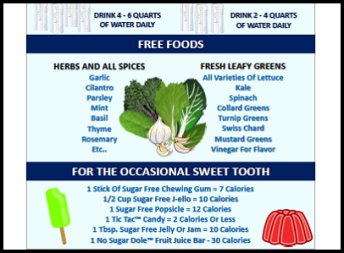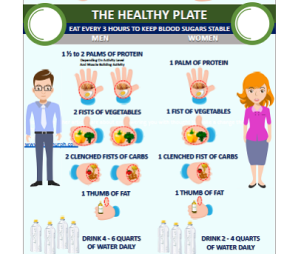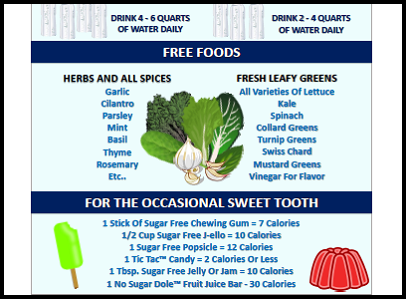By Chef K.T. Murphy
8 Habits That Sustain Good Health:
Maintaining a healthy eating habit requires planning and consciously making the decision to opt for healthier options. However, just making one change in your daily diet, like eating more fruits and vegetables, will make a big difference in the long run.
After once you’ve mastered one habit, change another in your diet, like decreasing the amount of processed foods you consume in a week. It may require willpower, but we’re creatures of habit. Therefore, if you stay at it for a couple of days, then everything will go downhill from there.
The trick is to eat the amount of calories appropriate with the amount of energy you need, depending on how active you are. If you eat too much, you’ll wind up gaining weight and if you eat too little, you’ll wreak havoc on your physical and mental health. On average, men are recommended to eat 2500 calories per day, while women should consume no more than 2000 calories each day.
Here are a few tips to help you practice mindful eating, where you’re consciously aware of what you’re eating and how to choose foods rich in nutrients and minerals, and low in fat, sugar, and salt.
1. Stay away from processed foods: Processed foods are all around us, and not all of it is bad for you. Yogurt and cheese are two examples of clean processed foods. However, it’s the types of food with artificial coloring and hard-to-pronounce ingredients, trans fat and partially hydrogenated oils, that you need to stay away from. These ingredients lead to chronic diseases like cardiovascular diseases, type-2 diabetes, hypertension and liver diseases.
The smart thing to do is wash and prep your food as soon as you come home from the grocery store. Even if you dedicate half an hour to getting food ready, you’ll thank yourself later in the week when you don’t’ have time to get anything ready. It’s mainly about convenience.
2. Reduce your sugar intake: Sadly, most of us consume 4 times more sugars than the recommended 6 teaspoons for women and 9 teaspoons for men. Sugar is everywhere, and it’s the hidden sugars that trick us the most. You probably didn’t know that the tomato sauce you buy, some cereals, and even some types of yogurt, all contain hidden amounts of sugar. To avoid getting too much sugar, try to limit your intake of desserts, soda and baked goods. Whenever you crave something sweet, try eating fruit instead or a granola bar, preferably homemade. You’ll find it’s just as delicious; it curbs your craving and has the added bonus of being rich in fiber, minerals, and nutrients so it’s a win-win situation.
3. Reduce your sodium intake as well: A big percentage of the salt we ingest comes from convenience, pre-packaged, takeout food. So in order to reduce the amount of salt in your daily diet, reduce the amount of fast food restaurants you visit throughout the week. In addition, when you cook, don’t use too much salt to flavor your food. Instead, opt for herbs and spices to give your cooking that extra kick.
4. Eat less meat: Reducing the amount of meat you consume will decrease your risk of heart disease, high blood pressure, and obesity. Focus on cooking your meat at home to get the most benefit. In addition, you should reduce the amount of processed meat, like sausages, bacon and cold cuts, because they tend to be high in fat and salt. They also contain chemicals and preservatives that may cause serious diseases like cancer.
Instead, you could make sure you get 2 portions of fish per week. Oily fish, like tuna, sardines, mackerel, herring, and salmon are rich in omega-3 fatty acids – a vital nutrient that helps protect against diseases and memory loss.
5. Eat more whole grains: While whole-wheat pasta and whole-grain bread may be regarded as processed foods, they’re what are known as “minimally processed foods” so they’re part of clean eating. There’s also quinoa, oats, brown and wild rice. If you buy products labeled ‘whole-grain’, make sure you take a look at the ingredients, which should have whole grain at the top of the list, followed by a short list with a minimal amount of sugar, if any at all. Keeping up the amount of whole grains in your life will help you lose weight and keep it off for longer, as well as provide you with a good amount of fiber and antioxidants.
6. Load up on fruits and veggies: Many scientific studies have proven the importance of getting enough produce in your diet. They help ward off chronic diseases, like obesity, type 2 diabetes, heart disease, and cancer. Fruits and vegetables also provide you with fiber, an important factor in sustaining the levels of good bacteria in your gut. Moreover, they’re chock-full of vitamins, minerals, and antioxidants, which rid your body from the harmful effects of free radicals.
It’s recommended to eat 5 servings of fruits and vegetables per day. Moreover, the best way to do that is to eat a wide range of produce in varied colors, which health nutritionists refer to “eating the rainbow.” This provides you with various phytonutrients naturally found in produce and fight to protect your body against diseases. They also help keep you feeling fuller longer.
7. The 80/20 rule: The best way to ensure healthy eating is to follow the 80/20 rule of eating, which says that 80% of the day, you eat healthy, clean food and leave 20% for splurging so you don’t feel like you’re depriving yourself of anything. This rule will make you feel in control of what you’re eating while getting rid of the guilt associated with enjoying dessert or the craving that hits every now and then. It’ll release some of the pressure of always making sure you’re eating right.
The 80/20 rule also gives you the opportunity to practice mindful eating. When you’re eating a meal, that’s the perfect time to ask yourself whether you’re not you’re full to prevent yourself from overeating which happens more often than you think.
8. Portion Control: we don’t need to eat a 16oz steak when we only need 4 oz of red meat 7 to 12 days. Please look at the diagrams I had made. I find picture help.


People keep eating way after they’ve satisfied their hunger because of many reasons because we rarely think about what and how we eat.
All the best
Chef Murph
XoxoX
Tags: Chef K.T. Murphy, chef keith murphy, chef murph, Chef Murph KT, Chef Murph TV, Chef Murphy, Chinese, food, Foodist Networks, Global Fusion Americana, Good Healthy Habits, Recipes
